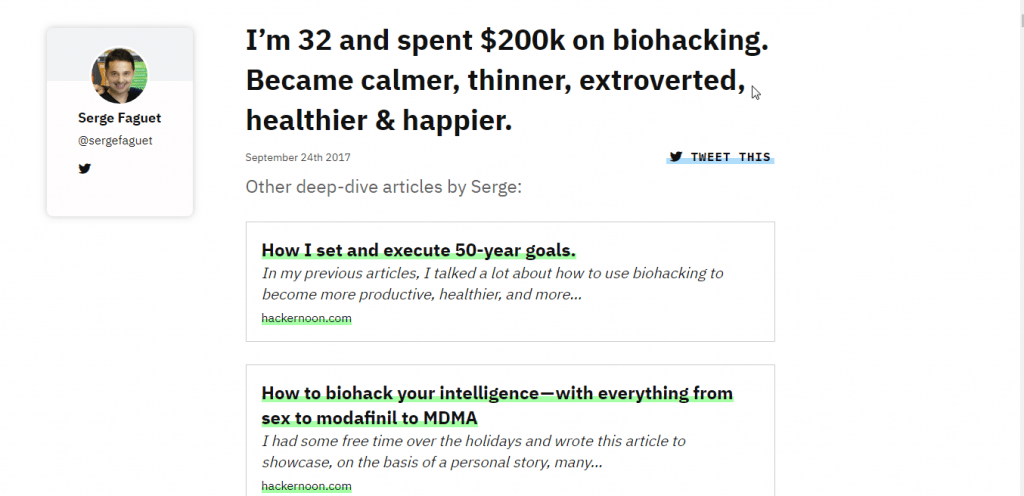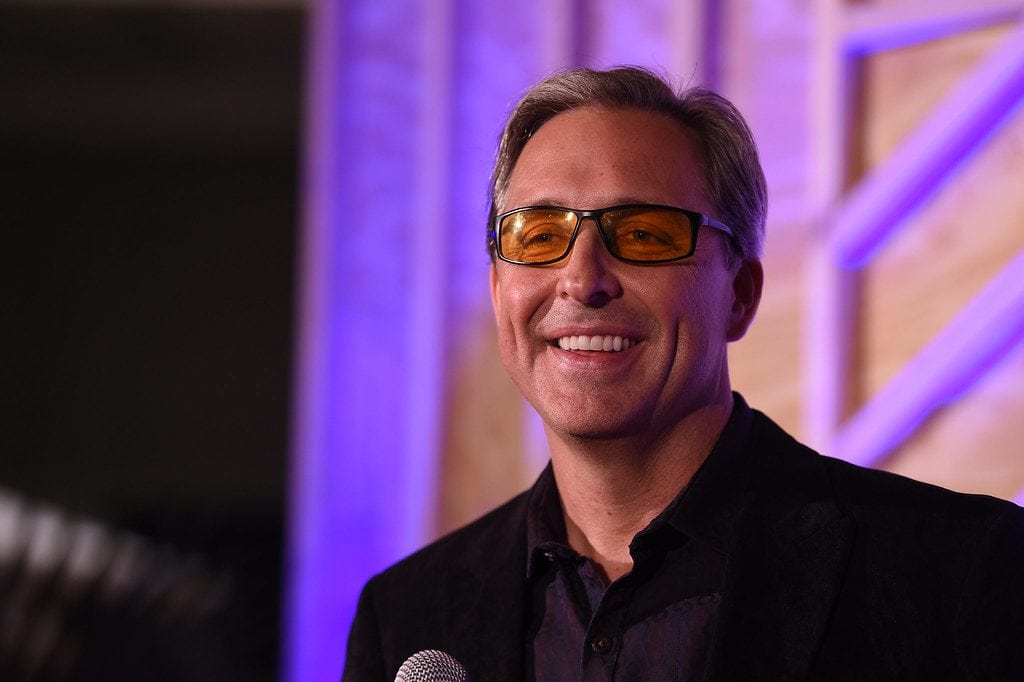At 34, most of us are content in the knowledge that, if things go well, we have at least another forty to fifty years left to accomplish everything we want before enjoying a comfortable, satisfied sail into the Great Unknown. But not Serge Fauget—he plans to live forever.
Fauget is one of a number of Silicon Valley millionaires spending fortunes on biohacking—the latest craze among wealthy techies who believe the human body can be hacked or programed just like a computer’s (or robot’s) and turned into something coldly efficient, practically error-free and potentially eternal. So far Fauget has splurged more than $200,000 on myriad treatments and tests that he believes put him on the path to immortality.
In September 2017, Fauget began writing about his biohacking experience on the website Hacker Noon. His first post, peppered with memes and entitled ‘I’m 32 and spent $200k on biohacking. Became calmer, thinner, extroverted, healthier & happier’, documents in intense detail the biohacking methods and results he has achieved over the past five years.

Fauget says he “attacks” six major blocks: Sleep Hygiene, Optimal Nutrition, Optimal Exercise, Mental Health, Medical Tests and Supplements & Drugs. We’re presented with numerous graphs (sleep patterns, cholesterol levels, mercury levels, hormones, body fat/muscle composition, etc.), and it’s clear that much of what Fauget is doing is producing beneficial results.
Where it gets weird is when he goes into the realms of immortality and elitism—“I expect that even without major medical progress, I will be in excellent mental/physical condition at 100 and will live longer than any human who has ever lived as of 2017. With tech progress, it seems likely that immortality is reachable”— and more so in his follow-up post where he suggests anyone who does not start biohacking their intelligence will become obsolete. He foretells a future in which wealthy (i.e. those who are “winning”) “enhanced post-humans” will develop super health and intelligence and leave “stupid” “unenhanced humans” in the dust.
“I expect that I will be in excellent mental/physical condition at 100 and will live longer than any human who has ever lived as of 2017.”
What’s unsettling is that this follow-up article is actually an edited version of an original post entitled ‘Biohack your intelligence now or become obsolete’. By way of an author’s note, Fauget says the “aggression” in the original piece “went too far and is not aligned with my values.” He goes on to explain that “there is a real risk of being left behind if you do not [biohack yourself]. I also want all of humanity to share in an amazing, grand future, whether they choose to be trans/posthumans or not… To that end I edited the article and removed some of the language I feel does not reflect how I see the world. To be clear I am not in any way going back on my aggressive beliefs or goals. I just realized that I was wrong to think that these goals must be in opposition to the goals of others. There is plenty of awesome future for everyone.”
Though varying in degrees of obsession and extremity, the notion of biohacking or merging humans with tech is predictably prevalent among the Silicon Valley set. See Calico (short for the Californian Life Company) founded in 2013 by former CEO of Google Ventures Bill Maris. His philosophy behind Calico—initially funded with $1-billion and the support of Google founders Larry Page and Sergey Brin—is to “solve death.” And while Calico’s work remains mostly secretive, there are reports of extensive biomarker tracking and experimentation on a 1,000-strong colony of mice. There’s also Neuralink, Elon Musk’s 2017-launched company that wants to find ways to connect computers with human brains.

One slightly less unsettling (but no less wealthy and obsessive) biohacker is Bulletproof Coffee founder Dave Asprey. Not part of the Silicon Valley set—he lives in British Columbia—Asprey’s latest biohack was a substantial (and very expensive) stem cell treatment which he intends to repeat every six months. He takes more than 100 supplements a day, bathes himself with infrared light, sits in a cryotherapy chamber and uses an atmospheric cell trainer, which is essentially a machine that replicates high altitude so that your starved red blood cells are shocked into producing more of themselves.
Asprey, who is 45, reckons he’s spent well over $1-million on his biohacking so far and, like Serge Fauget, he intends to live for record time—at least 180 years. And although Asprey likes to talk about the idea of becoming superhuman, the main difference between him and Fauget is that Asprey doesn’t seem to share the same elitist ideas over future health and ageing. He envisions a world where anyone can take control of their health using affordable tech and not have to depend on doctors and increasingly expensive public healthcare to determine their physiological status.
“Regulation got us the food pyramid that causes heart disease, cancer, and diabetes in unprecedented numbers of people,” Asprey said in a recent Men’s Health article. “It got us an incredibly slow-to-innovate medical system that’s now being disrupted. It is antihuman to tell someone that they do not have the choice to put whatever they want into their bodies. It’s a basic human freedom. I think it’s unethical that I need to spend $150 and an hour of my life to get a permission slip to take a substance. There is no, no reason for that.”

Putting Silicon Valley nuts and obsessive, cryogenically-frozen millionaires to one side, biohacking does not have to mean huge expense, unhinged views of humanity and a pathological denial of death. When you get down to it, biohacking is really just another trendy buzzword for physical and mental wellbeing.
Ben Angel, an Australian-born US-based marketing guru and personal development coach recently released his book ‘Unstoppable’. In it, he details the somewhat more conventional and accessible biohacking methods he used to overcome the severe depression and fatigue that threatened to derail him.
He goes on a 90-day mission, travelling around the world, meeting with doctors, neuroscientists and biohackers, and tries out a range of supplements and wearable tech. He subsequently launched a biohacking course that achieved $500,000 in sales in just four months. He defines biohacking as the art and science of looking at your biochemistry and your psychology and changing internal and external environmental factors to optimise yourself.
“People out there are really seeking answer for their health, especially entrepreneurs,” Angel said in an interview with Entrepreneur magazine. “They’re chronically stressed, they’re worried about finances, they wonder when the next cheque or sale is going to come in through the door, and that chronic stress causes a whole host of other issues. It can trigger depression, anxiety, inflammation within the body and sleep disorders. Unfortunately these issues can get blamed on a lack of willpower and a weak mental mindset when in fact it’s the biochemical side of things that really fuelling one part it, then the other part is the psychological side. I’ve kind of taken a step back and looked at the biochemistry stuff and see how it’s influencing our psychology at an unconscious level.”

There is another aspect to this of course, which is that biohacking is not only a fad and a business but is also largely unfounded. Critics of biohacking—and there are many—site the fact that millions of years of evolution and biology are too complex to ‘fix’ over such a relatively short period as a human lifespan, not to mention the fact we cannot escape our genetics. Another argument against biohacking is that our bodies are already very efficient and optimised—how else do they keep us alive and conscious every day?
In this data-obsessed age, are we not overcomplicating something that is very, very simple? For many, and perhaps some of you reading this article, the idea of spending that much time, effort and money on every minutiae of your biological systems is so daunting that you wouldn’t know where or how to start. And now, because biohacking is becoming increasingly trendy, you might feel you’re lagging behind ‘posthumanism’ and doing your body a gross disservice by not tracking its every process.
If you’re feeling this way, if the idea of wearing body monitoring tech and taking 100 pills a day even though you’re feeling perfectly fine overwhelms and mystifies you, refer to a 2009 study entitled ‘Healthy living is the best revenge: finding from European Prospective Investigation into cancer and nutrition-Potsdam study’. In it, it posits that just four factors—whether or not you smoke, your BMI, your diet and your level of physical activity—were found to profoundly affect your chances of either getting or avoiding major diseases such as cancer, heart disease and diabetes.
So, if you’re into data and up for some experimentation, maybe give biohacking a try. If done carefully, it’s not likely to do you any harm, though whether it does you any good seems up for debate.
If you couldn’t be bothered just remember—don’t smoke, eat right, exercise regularly and chances are you’ll be okay.
